Sociology of Religion \ 1-1
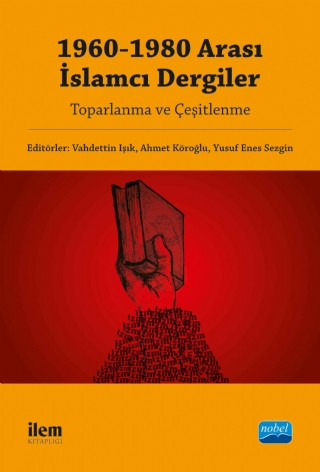
With each passing day, we understand better that the period of introversion shaped around the adventure of the nation-state creates a serious limit in the world of thought. This can be clearly observed when agendas, concepts, and priorities in handling issues are followed. It is possible to say that the period when the signs of overcoming this limitation were seen in the most concrete way was the years between 1960 and 1980, when the multi-party life became relatively permanent. To a certain extent, this period, in which different layers of the public are directly involved in the process, continues to be influential today, both in terms of its specific weight in Turkey's recent history, as well as new searches, channels, institutionalizations, diversifications and discourse differentiations in the history of Islamist thought and publishing. .
In addition, the fact that a significant part of the people who took an active role in the activities of the period are still alive, allows a tested eye to examine a reading to be made from today. Considering that a very important part of the cadres who carry today's Turkey in politics, bureaucracy, civil institutions and intellectual fields are the generations that grew up in the 1960-1980 period, the importance of those years will be better understood. In conclusion, in order to better understand the present, it is quite clear that it is necessary to closely examine the years of 1960-80, which is almost the womb of today. Therefore, both contributing to the understanding of the process we are witnessing and providing the opportunity to create a bridge between these living historical witnesses and new generations reveals both the intention and the value of this study.
In addition, the fact that a significant part of the people who took an active role in the activities of the period are still alive, allows a tested eye to examine a reading to be made from today. Considering that a very important part of the cadres who carry today's Turkey in politics, bureaucracy, civil institutions and intellectual fields are the generations that grew up in the 1960-1980 period, the importance of those years will be better understood. In conclusion, in order to better understand the present, it is quite clear that it is necessary to closely examine the years of 1960-80, which is almost the womb of today. Therefore, both contributing to the understanding of the process we are witnessing and providing the opportunity to create a bridge between these living historical witnesses and new generations reveals both the intention and the value of this study.

This book has been prepared to deal with the ways in which otherness transforms into excluded otherness and to discuss this within moral thought. Because if a moral relationship is not established with the existence of the other, the alienation of the other emerges.
Today, problems arising from otherness occupy the agenda all over the globe. Xenophobia, ethnocentrism, racism, religious fanaticism, Islamophobia and nationalism are among the rising threats of our age. While nation states resort to identity-reinforcing policies with exaggerated security discourses to overcome their legitimacy crisis,
On the other hand, the socio-cultural crises faced are pushing the masses towards marginalizing language. Increasing global conflicts and the resulting migration waves bring up traumatic encounters with someone else. In this context, there is a need for a new perspective on morality and the other. If the existence of someone else, who has a moral idea in his essence, is taken as the basis of human life, a recognition can take place without othering, and this recognition can bring about a moral obligation.
Within the framework of this perspective, there are articles in the book that deal with the concepts and debates about the other/other in modern philosophy and Islamic thought.
is. Thus, it is aimed to create a new approach as well as a general and comparative perspective.
Contributors
Ahmet Ayhan Çitil • Burhanettin Tatar • Cafer Sadik Yaran • Kasım Küçükalp Lütfi Sunar • Ömer Türker • Özkan Gözel • Selami Varlık
Today, problems arising from otherness occupy the agenda all over the globe. Xenophobia, ethnocentrism, racism, religious fanaticism, Islamophobia and nationalism are among the rising threats of our age. While nation states resort to identity-reinforcing policies with exaggerated security discourses to overcome their legitimacy crisis,
On the other hand, the socio-cultural crises faced are pushing the masses towards marginalizing language. Increasing global conflicts and the resulting migration waves bring up traumatic encounters with someone else. In this context, there is a need for a new perspective on morality and the other. If the existence of someone else, who has a moral idea in his essence, is taken as the basis of human life, a recognition can take place without othering, and this recognition can bring about a moral obligation.
Within the framework of this perspective, there are articles in the book that deal with the concepts and debates about the other/other in modern philosophy and Islamic thought.
is. Thus, it is aimed to create a new approach as well as a general and comparative perspective.
Contributors
Ahmet Ayhan Çitil • Burhanettin Tatar • Cafer Sadik Yaran • Kasım Küçükalp Lütfi Sunar • Ömer Türker • Özkan Gözel • Selami Varlık

From the moment we were convinced that man was born without a given meaning and was defined by the functions or roles he was assigned from the moment he opened his eyes, it became increasingly difficult to expect anything from man. Moreover, such expectations were always confronted with demands for freedom. This book is "What can we expect from a free man?" It grew out of a strong belief that the question can still be asked in a meaningful way. The different conceptions of man in the Islamic tradition of thought, despite all their differences, are optimistic about our expectations of man. However, how this expectation can be grounded. He found different answers within the philosophical, theological, mystical and jurisprudential perspectives in the tradition of Islamic thought.
The study, which includes fourteen articles, investigates the answers given by different disciplines in the tradition of Islamic thought and the different schools within these disciplines to the question of what a human is and what is really expected of him. For these perspectives, which all consider human life as a long story that progresses in a constant test, human is always something that is "being". The main factors that direct our ability to "be", where this ability should lead, and the areas of accrual constitute important topics in the evaluations of what a human being is. The articles in this study proceed through these questions, while investigating the nature of human beings in the traditions of philosophy, theology, mysticism and fiqh, on the other hand, they deepen the current possibilities of these perspectives.
The study, which includes fourteen articles, investigates the answers given by different disciplines in the tradition of Islamic thought and the different schools within these disciplines to the question of what a human is and what is really expected of him. For these perspectives, which all consider human life as a long story that progresses in a constant test, human is always something that is "being". The main factors that direct our ability to "be", where this ability should lead, and the areas of accrual constitute important topics in the evaluations of what a human being is. The articles in this study proceed through these questions, while investigating the nature of human beings in the traditions of philosophy, theology, mysticism and fiqh, on the other hand, they deepen the current possibilities of these perspectives.
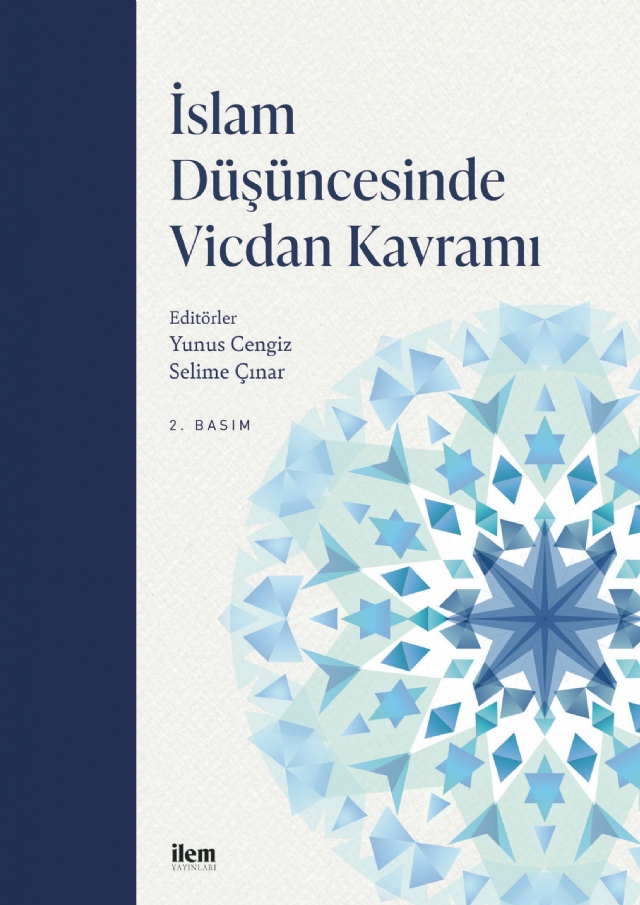
The concept of conscience, which is one of the key concepts for moral thought, is often used in the sense of "moral consciousness" today. When we look at the thought of Islam, it is difficult to say that the word conscience is used in this sense or that it is commonly used with such a content. As a matter of fact, in many texts, this concept is mentioned in a way that corresponds to intuition in an epistemological sense, not moral.
The aim of this study is to process the concept of conscience through Islamic traditions and to determine the equivalent of the concept in these traditions. This situation necessitates us to deal with the texts that aim to analyze the mental states and their practical consequences that provide the moral awareness of the actor against an action, regardless of whether the conscience is literal or not. If we do this, we will not only find the opportunity to reinterpret the classical texts on moral psychology, but also contribute to the reproduction of Islamic moral philosophy.
In the articles included in this book, which consists of the works presented at the Conscience in Islamic Thought Workshop hosted by İLEM-ILKE on June 3-4, 2016 within the scope of the Islamic Moral Thought Project, the way of problematizing the inner state that encourages people to act correctly, their reflections in different fields and psychological -theological foundations are discussed in terms of relevant traditions.
The aim of this study is to process the concept of conscience through Islamic traditions and to determine the equivalent of the concept in these traditions. This situation necessitates us to deal with the texts that aim to analyze the mental states and their practical consequences that provide the moral awareness of the actor against an action, regardless of whether the conscience is literal or not. If we do this, we will not only find the opportunity to reinterpret the classical texts on moral psychology, but also contribute to the reproduction of Islamic moral philosophy.
In the articles included in this book, which consists of the works presented at the Conscience in Islamic Thought Workshop hosted by İLEM-ILKE on June 3-4, 2016 within the scope of the Islamic Moral Thought Project, the way of problematizing the inner state that encourages people to act correctly, their reflections in different fields and psychological -theological foundations are discussed in terms of relevant traditions.
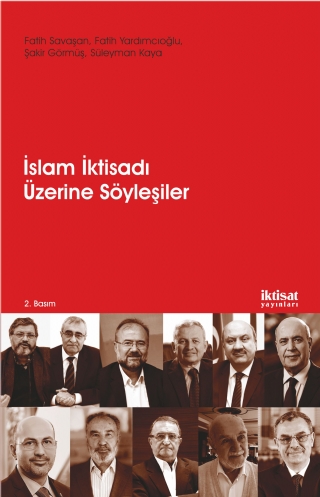
Many issues such as what the economic view of Islam is, whether it offers an economic system, what solutions it provides to people's needs, and through which institutions historically Muslims carry out their economic activities have been discussed by different segments for a long time and still continue to be discussed. Not only theoretical efforts, but also many practical efforts have been put forward and institutions have been established. Sometimes the practice side, led by Islamic banks, directed other theoretical studies, and sometimes the theory tried to influence the practice. On the other hand, with the growth of Islamic finance, regulatory authorities have inevitably been included in this ecosystem. In the end, many stakeholders, interconnected or not, ponder on Islamic economics and finance and contribute to keeping this field on the agenda.
Studies in the field of Islamic economics and finance have increased for Turkey, especially after the 1980s. Islamic lawyers, employees in the Islamic finance sector, regulatory agencies, academics and many more contribute to the field. Among them, some names played leading roles in their own fields and have been influential in the reaching of Islamic economics and finance to a much wider audience today. This book consists of interviews with professors who have worked in this field for many years, industry representatives and regulators operating in the field of Islamic finance.
Studies in the field of Islamic economics and finance have increased for Turkey, especially after the 1980s. Islamic lawyers, employees in the Islamic finance sector, regulatory agencies, academics and many more contribute to the field. Among them, some names played leading roles in their own fields and have been influential in the reaching of Islamic economics and finance to a much wider audience today. This book consists of interviews with professors who have worked in this field for many years, industry representatives and regulators operating in the field of Islamic finance.

The process of "masking the society" with Covid-19 inevitably affects religious beliefs and practices. Social obligations and the sanctioning power of the state deeply affect the familiar things of religion such as gathering, worshiping collectively, synchronously repeating the sacred words, touching and feeling, in other words, the way religion is experienced. The physical nature of worship can be transferred to online environments, and unexpected and radical measures can be taken, such as closing mosques for worship as in Turkey, suspending Hajj by the Saudi government, or burning Muslims who died of Covid-19 in Sri Lanka, by government force. Similarly, New Age beliefs can continue to develop their market and gather new followers by associating bodily health with the transcendent by taking advantage of this gap, Muslims in India can be labeled as "super spreaders" of Covid-19, and in many places people are subject to social exclusion due to their religious identity. may be exposed.
Although the Covid-19 epidemic is a multidisciplinary and interdisciplinary phenomenon that needs to be dealt with within the framework of understanding, the effect of this process on religious beliefs and practices should be determined, and especially the process and its results should be discussed by the Turkish academy. It is thought that this book project, which consists of twelve chapters and was prepared with the participation of 14 authors who produce in fields such as sociology, sociology of religion and philosophy of religion, will contribute to the academicians and students working in the related field, as well as to the family of readers who are interested in this field.
Although the Covid-19 epidemic is a multidisciplinary and interdisciplinary phenomenon that needs to be dealt with within the framework of understanding, the effect of this process on religious beliefs and practices should be determined, and especially the process and its results should be discussed by the Turkish academy. It is thought that this book project, which consists of twelve chapters and was prepared with the participation of 14 authors who produce in fields such as sociology, sociology of religion and philosophy of religion, will contribute to the academicians and students working in the related field, as well as to the family of readers who are interested in this field.

Jerusalem contains a witness that has been given to very few cities in history. In the past century, the occupation of Jerusalem and the problems of the Islamic World have progressed in parallel. This situation requires a multidimensional evaluation with its intellectual, geographical, socio-cultural and economic components, beyond being an issue that only awaits a political solution.
Jerusalem studies are getting richer day by day. Uncovering the social and spatial remnant of the ancient city and producing the scientific archive against the destruction of Jerusalem by reduced interventions to the nation ideology is seen as an indispensable prerequisite for these researches.
The book in your hand has been prepared with the aim of contributing to the expanding Jerusalem Library in Turkey. In the book, a versatile Jerusalem perspective is presented through original studies that evaluate Jerusalem in terms of its historical, cultural, urban and architectural dimensions and address the Jerusalem issue from the perspective of international law.
Jerusalem studies are getting richer day by day. Uncovering the social and spatial remnant of the ancient city and producing the scientific archive against the destruction of Jerusalem by reduced interventions to the nation ideology is seen as an indispensable prerequisite for these researches.
The book in your hand has been prepared with the aim of contributing to the expanding Jerusalem Library in Turkey. In the book, a versatile Jerusalem perspective is presented through original studies that evaluate Jerusalem in terms of its historical, cultural, urban and architectural dimensions and address the Jerusalem issue from the perspective of international law.
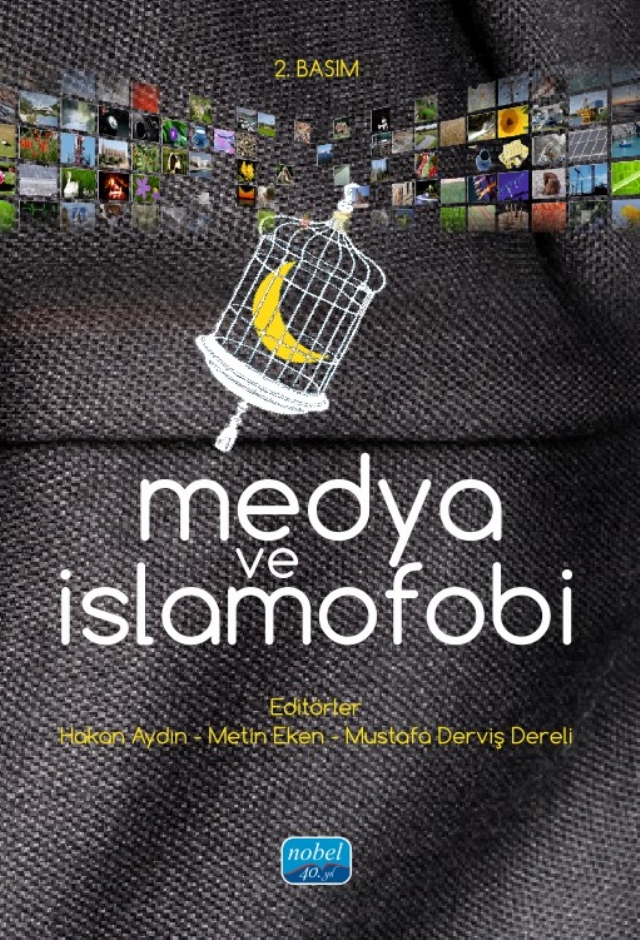
In recent years, Islamophobia, as an expression of fear based on prejudice and discrimination, has become one of the most fundamental psychological, social and political problems that lead to antipathy, hatred, violence and hostility towards Muslims all over the world. Exclusion in processes related to political administration, social responsibilities and employment; discrimination in the provision of services such as education and health; Prejudice in media and daily conversations and in daily life both verbal and physical violence produces many negative results. The media plays a very active role in the production and shaping of the perception that reveals these results. The effects of Islamophobic elements, which spread from traditional media elements to new media, have not yet been adequately addressed academically and sufficient information has not been produced to affect the policies on this issue. This study, which includes some important book reviews in addition to sixteen articles, is expected to constitute an important source for the questioning of the relation between the media and Islamophobia, as well as the relation between media and religion in Turkey.

Studies on Islamic movements, or more specifically the Muslim Brotherhood, have often focused on ideological foundations or tensions with the political regime. Although there are a limited number of analyzes on the organizational structure of the movements, the way they are organized, the method of education and ideological indoctrination in these studies, the factor of institutionalization has always been left out of consideration in these analyses. The most important reason underlying this is that Islamic movements are not accepted as political institutions. Considering that political institutions are structures that attribute value and identity to their members, Islamic movements should be accepted as political institutions and their institutionalization processes should be taken into account, since they have similar characteristics. In this context, the book in your hand tries to answer the question of how the institutionalization processes of Islamic movements should be analyzed based on the assumption that they are also political institutions. In the book, in the example of the Muslim Brotherhood, which is considered the pioneer of Islamic movements, the institutionalization problem of the Movement is analyzed over six parameters, and the level of institutionalization of the structure is analyzed within the framework of its relationship with the Egyptian regime, in addition to the internal tensions and debates it has experienced since 1928.

The Middle East, which has been a center of attraction in every period of history due to its rich oil and natural gas deposits and being the center of monotheistic religions, is an unfortunate geography that has witnessed conflicts and wars in every period as a natural consequence of these characteristics. Factors such as power or prosperity revealed by classical approaches are insufficient to explain the events in international relations in the Middle East. Therefore, the internal dynamics of the region should be known very well. One of the most important internal dynamics in explaining the events in the region is the understanding of "Salaf" religion. This book explains the reasons for the events and conflicts in the Middle East by giving answers to questions such as what Salafism is, how it emerged, what historical processes it has reached today, what its types are, how it affects the people living in the region, events and international relations.

Although it is noteworthy that one of the cornerstones necessary to understand and make sense of the Middle East after the 2011 Arab uprisings is the relationship between politics and religion in the region, the importance of the issue is increasing day by day. As academics in Turkey, we tried to deal with the developments in the region and the background of the events.
As part of the ILEM Islamic Political Thought Project, we held a series of seminars under the heading "Politics and Religion in the Middle East". Our aim was to try to understand the politics-religion relationship in the region through different religious and political schools. In 2017, we tried to deal with issues in a different spectrum, from the origins of the two main currents in the region, $ii and Sunni political thoughts, to today's political reflections. Of course, the issues we deal with are neither limited to the seminars nor as they appear in the book; has much broader extensions. Nevertheless, we tried to produce a comprehensive and representative work.
As part of the ILEM Islamic Political Thought Project, we held a series of seminars under the heading "Politics and Religion in the Middle East". Our aim was to try to understand the politics-religion relationship in the region through different religious and political schools. In 2017, we tried to deal with issues in a different spectrum, from the origins of the two main currents in the region, $ii and Sunni political thoughts, to today's political reflections. Of course, the issues we deal with are neither limited to the seminars nor as they appear in the book; has much broader extensions. Nevertheless, we tried to produce a comprehensive and representative work.
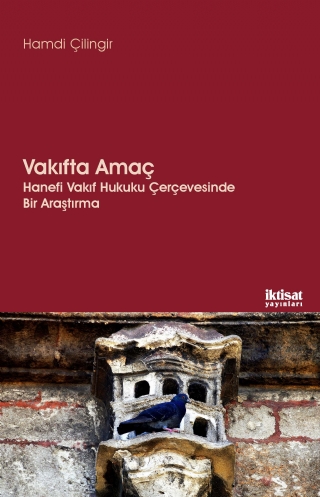
The foundation is a very important institution that takes its essence from the understanding of charity and infaq in Islam, has developed and enriched with the experiences of Muslims in the historical process, and covers almost all areas of life with the purposes it serves. Islam, on the one hand, obliges Muslims to perform obligatory sadaqah (sadaka-i vâcibe) such as zakat, alms, and tithe, on the other hand, encourages them to do voluntary sadaqah (sadaka-i nafilah). Among these futile types of charity, the foundation has followed a very important development course in history in terms of institutionalism, prevalence and the purposes it serves. The freedom of the person who established a foundation to set a purpose for his foundation has revealed a wide variety of purposes in foundations over time. Indeed, this diversity of aims has been well documented and demonstrated in historical studies.
This book approaches the issue of purpose in the foundation from a different perspective, deals with the issue in a legal framework and tries to draw a theoretical framework for the purpose of the foundation.
This book approaches the issue of purpose in the foundation from a different perspective, deals with the issue in a legal framework and tries to draw a theoretical framework for the purpose of the foundation.
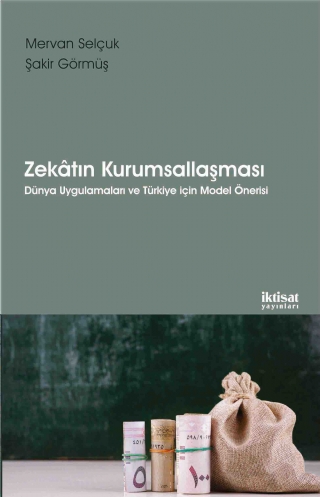
The connection of Muslims with zakat has decreased day by day and has almost reached the breaking point. It is seen that there is a decrease in the number of people who calculate zakat in accordance with its originality and deliver it to those who deserve it. While the zakat potential of Islamic countries can easily eliminate the problems of income distribution and poverty, the insufficient institutionalization of zakat causes many socio-economic problems and an inability to effectively combat existing problems. Hz. Although it cannot be collected and distributed under the authority of the state and forcibly, as in the Sunnah of the Prophet (pbuh), it is seen that zakat is tried to be implemented in an institutional structure with state support in countries such as Malaysia, Indonesia and Pakistan. In this study, information about the countries where zakat is applied in an institutional structure is given and these zakat institutions are examined comparatively. In the light of this information, taking into account the existing legal and institutional structures, a model has been created for a modernly applicable zakat institution in Turkey.